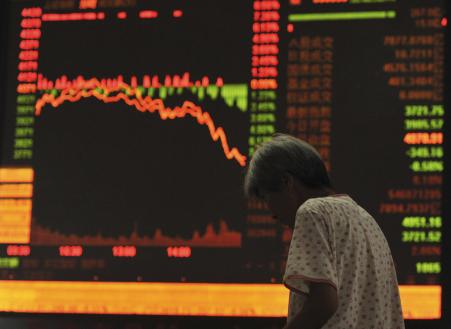By Aditya Tejas -

Trading on China's two main stock exchanges remained volatile on Tuesday, continuing a rout that has raised worries about the country’s economy, and casting doubts about the success of the government's measures to prop up domestic stock indexes.
Beijing struggled to contain losses from spiraling further, despite Monday's announcement that it will increase its purchasing of shares in order to support flagging stock markets. The Shanghai Composite fell 4 percent upon opening while the Shenzhen Component index saw a 5 percent decline. However, the markets subsequently regained some ground to close the day down 1.7 percent and 1.4 percent respectively.
Shanghai Composite Index (Closing) | FindTheData
The weak showing followed Monday's dramatic fall, which wiped $613 billion off the market in an 8.5 percent tumble, which marked the country’s biggest one-day drop in over eight years. The Shanghai Composite fell below the psychologically important 4,000 benchmark, and closed Tuesday at just over 3,663.
Monday’s rout seemed to end a three-week push that was propped up by aggressive intervention from the Chinese government.
In a statement issued after markets closed on Monday, the China Securities Regulatory Commission said it would "continue to stabilize the market, to reassure public confidence, to safeguard against systemic risks," attempting to quell rising panic among the country’s 90 million individual investors, according to CNN.
The regulator also said that it would investigate those engaged in the "malicious shorting of stocks." Authorities had previously said that they had found preliminary evidence of market manipulation.
As the markets opened Tuesday, the People's Bank of China used reverse-repurchase agreements to inject 50 billion yuan ($8 billion) into the country’s banks. The central bank also said it would use various monetary tools to maintain liquidity, Reuters reported.
As part of measures introduced after the last stock market crash earlier this month, the government ordered brokerages to buy local stock worth about $20 billion, and extracted a promise that they would not be sold until the Shanghai Composite hit 4,500. Authorities also restricted trading in the stock of several companies and halted many new listings. At one point, over half of the companies on the Shanghai Composite index were suspended from trading.
The ruling Communist Party has also grown increasingly concerned over a slowing economy slowing. China clocked a growth rate of 7 percent in the first quarter of year -- its slowest in six years -- prompting a slew of measures, including shaming the country's slow-moving bureaucracy into faster action.
As shares continued to fall despite the measures, however, questions have been raised about the public’s faith in the government's measures.
"To me it's just another painful lesson that what goes straight up is not sustainable – [there are] lots of margin accounts [with] individuals holding them - that's not a recipe that ends well," Mark Eibel, client investment director for Russell Investment, told CNBC.
